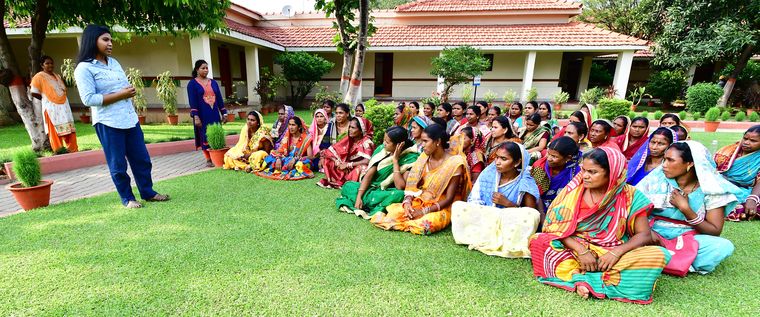“JAMSETJI NUSSERWANJI TATA was one who knew how to acquire and how to dispose of a fortune,” wrote Frank Harris in Jamsetji Nusserwanji Tata: A Chronicle of His Life. Jamsetji’s “breadth of vision and genius for organization” combined with his altruistic and benevolent nature was at the core of the Tata Group's philosophy of giving back to society. That is why, perhaps, he is called a pioneer and a philanthropist. So deeply ingrained is this philosophy that not just his sons, Sir Dorabji Tata and Sir Ratanji Tata, but even their successors and lieutenants have pledged their unflinching support to improving the quality of life of Indians.
Over the decades, the Tata Trusts (comprising J.N. Tata Endowment, Sir Dorabji Tata Trust, Sir Ratan Tata Trust, Lady Tata Memorial Trust, Lady Meherbai D. Tata Education Trust, J.R.D. and Thelma J. Tata Trust, to name a few) have not only contributed enormously to nation-building, but also given India some of its finest institutes such as the Indian Institute of Science, the Tata Institute of Social Sciences, the Tata Institute of Fundamental Research and the National Centre for the Performing Arts. The Tata Trusts, which hold two-thirds of the shareholding of Tata Sons, have also worked tirelessly to uplift the underprivileged sections of society.
Take, for instance, the work that the Tata Trusts is doing in cancer care. Dr Mammen Chandy, director, Tata Medical Center, Kolkata, said the trusts are working towards making cancer care affordable and accessible. “The trusts are working with the government to develop tier one, tier two and tier three centres, and are going to provide a cancer care facility in each medical college so that there is more access,” said Chandy. Through the Assam Cancer Care Foundation, 19 such centres will come up in the state, which would be connected via Digital Nerve Centre (DiNC).
DiNC is a smart initiative of Tata Consultancy Services, started a year ago at the All India Institute of Medical Sciences, Delhi. Thanks to the concept of patient navigation, wherein the appointment system was streamlined, DiNCs “have simplified the lives of patients, allowing them to reach the next desired clinical service effortlessly”, said Chandy. Besides AIIMS, Tata Medical Center, Kolkata, Adyar Cancer Institute, Chennai, Tata Memorial Hospital, Mumbai, and Regional Cancer Centre, Thiruvananthapuram, DiNCs are also being introduced in hospitals on the National Cancer Grid.
Along with health departments of states, NGOs and other stakeholders, the trusts also work extensively in infant and maternal health care. The underlying idea is that no underprivileged child or pregnant woman should go without a wholesome meal. The trusts have tackled the malnutrition issue head on by working through anganwadis and reaching out to schoolchildren via midday meal schemes.
At Kalinganagar in Odisha, where Tata’s new steel plant has come up, the trusts have started the 1,000-school project. Along the 260km Jamshedpur-Kalinganagar corridor, teams that are mapping the corridor have been visiting villages in six districts and ensuring that all children go to school and don't end up as labourers. “So, if we say this corridor will be child-labour free, that is a big ambition to have,” said T.V. Narendran, CEO and managing director, Tata Steel Limited. “But, it is not just about making headline-grabbing statements; it is about doing the groundwork and saying these are the outcomes. This is an example of the trusts encouraging us to think a little bit bigger.”
The trusts are also working towards empowering tribals. Jiren Topno, from the Corporate Social Responsibility (CSR) team of Tata Steel Limited, said it was J.R.D. Tata who, in the 1970s, first thought of interacting with tribals. That is how Tribal Affairs was formed. It later became the Adivasi and Harijan Cell, and finally evolved into the Tribal Cultural Society. Now, they concern themselves with four aspects—education, maternal and neonatal health, livelihood and tribal identity. So, they have scholarships such as Jyoti Fellowship and Tata Steel Scholarship and health programmes like MANSI (Maternal and Neonatal Survival Initiative). Through MANSI, they have been able to bring down the infant mortality rate by 50 per cent. Apart from creating employment opportunities, the CSR team is hard at work to understand the sociocultural context of the tribal people. “Tata Steel can’t tell someone what their identity is,” said Sourav Roy, chief, CSR, Tata Steel Limited. “We can, at best, only gently nudge them in the right direction and help them make choices.”
Tribals are more evolved than what we assume them to be, said Sunil Bhaskaran, vice president, corporate services, Tata Steel Limited. “There is a lot that we can learn from them,” he said. “Their way of looking at life is a little different. Our work has mostly been in trying to engage the tribals to understand better what their worldview is and about being able to help them. We try to work a lot on protecting their culture, art and history. We are doing our best in terms of skilling and giving them the opportunity in education and the corporate structure.”
In Kalinganagar, 1,234 families were displaced owing to the new plant. As part of the rehabilitation and resettlement policy, one member of each family was promised a job. “Till I left [Kalinganagar] two years ago, I was in-charge of getting them a job, and I had completed around 500 families. Of these, 18 had joined as officers,” said Topno. The trusts provided them with scholarships—some opted for MBA, while others chose engineering. Once the course was complete, they were employed as officers. Topno said eight to ten people had come for internships last year. Six of them, including two tribals, have been given pre-placement offers. “We haven’t just made inroads,” said Topno, “we have made highways into their lives.”


